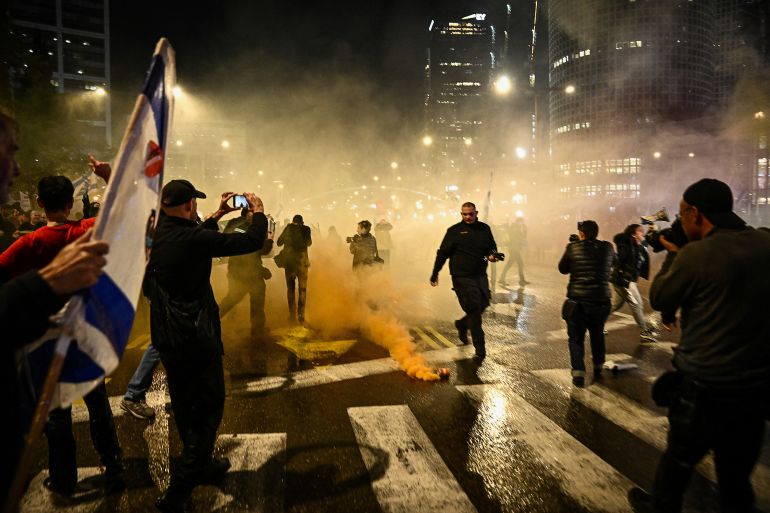Israeli delegation expected in Qatar for more Gaza talks
Framework of the agreement includes a six-week pause in fighting that could see an exchange of captives and increase in aid.

An Israeli delegation is expected to arrive in Qatar soon to continue talks on securing a pause in the war on Gaza that could see captives released.
The talks began last week in Paris and were attended by the chiefs of Israel’s spy agency Mossad and domestic security service Shin Bet, along with mediators from the United States, Qatar and Egypt.
Keep reading
list of 4 itemsIsrael’s war on Gaza: List of key events, day 142
Israeli air raid hits residence, kills at least seven in Gaza’s Rafah
Photos: Palestinians cling to life in Gaza’s Rafah
The four countries have come to an understanding of “basic contours” of a hostage deal for a temporary ceasefire in Gaza, US National Security Advisor Jake Sullivan said on CNN on Sunday.
The deal is still under negotiation, Sullivan said, adding there will have to be indirect discussions by Qatar and Egypt with Hamas, the Palestinian group that governs Gaza.
Meanwhile, Israeli Prime Minister Benjamin Netanyahu on Sunday said it was not clear yet whether a hostage deal would materialise from ongoing talks, declining to discuss specifics but saying Hamas needed to “come down to a reasonable situation”.
Netanyahu, speaking in an interview with CBS News, added he was meeting with staff later on Sunday to review a dual military plan that included the evacuation of Palestinian civilians in Gaza and an operation to destroy remaining Hamas battalions, which Israel says are located in Rafah in southern Gaza.
“If we have a deal, it will be delayed somewhat, but it will happen. If we don’t have a deal, we’ll do it anyway,” he told CBS.
Sullivan said on Sunday in an interview on NBC’s “Meet the Press” programme that US President Joe Biden has not been briefed on Israel’s plan for military operations in Rafah, but believes civilian life must be protected.
“We do not believe that an operation, a major military operation, should proceed in Rafah unless there is a clear and executable plan to protect those civilians, to get them to safety and to feed, clothe and house them,” Sullivan said.
After the Israeli delegation returned from the French capital, Israeli national security adviser Tzachi Hanegbi said that “there is probably room to move towards an agreement”.
According to Israeli media, negotiators had a meeting with the Israeli cabinet, which agreed to send a delegation to Qatar in the coming days to continue negotiations.
Al Jazeera’s Willem Marx, reporting from occupied East Jerusalem, said Israeli media are talking about the details of a framework for talks, which could potentially see a pause in fighting for up to six weeks if a captive is released each day from Gaza.
“It looks like there will be around 40 Israeli hostages being released – that would be women civilians, female soldiers, older men with serious medical conditions – in return for hundreds of Palestinian prisoners currently held in detention or Israeli jails.”
Marx said an agreement could also lead to a considerable increase in humanitarian aid going into the Gaza Strip and a potential return of Palestinians to the heavily bombarded and attacked areas in the northern part of the enclave.
“Hamas, crucially, has not commented on any of this,” he said.
Prior to the latest round of talks, Hamas had said it would accept nothing less than a complete cessation of fighting and an end to the siege of Gaza, something Netanyahu had dismissed while emphasising “total victory” over the armed group.
Close to 30,000 Palestinians, mostly women and children, have been confirmed killed by the Ministry of Health in Gaza, with thousands more missing and presumably still under the rubble.
More than 100 captives, including Israelis and other nationals, were released as part of a one-week pause in fighting in November, which also saw hundreds of Palestinians released from Israeli prisons.
‘We need a new government’
In Israel, pressure has been steadily building on Netanyahu and his war cabinet to strike a deal to secure the release of the captives.
Thousands of protesters once more gathered at what has become known as “hostages square” in Tel Aviv on Saturday to demand swifter action and new elections, with police using water cannon to disperse the crowds.
Al Jazeera’s Hamdah Salhut, reporting from Tel Aviv, said Saturday’s gathering was the “biggest show of force since the war began”.
“Antigovernment protesters say they will continue coming out every Saturday in full force until their message is received by the Israeli government.”
Neria Bar, a protester, told Al Jazeera that the government has failed and needs to be replaced.
“We need a new government, new people, new leadership, someone that counts us in and thinks about us, not just about themselves,” she said.